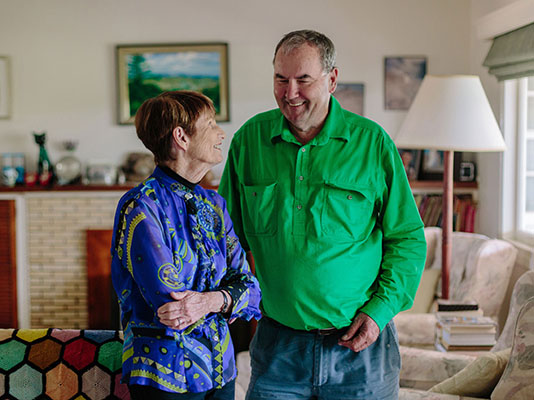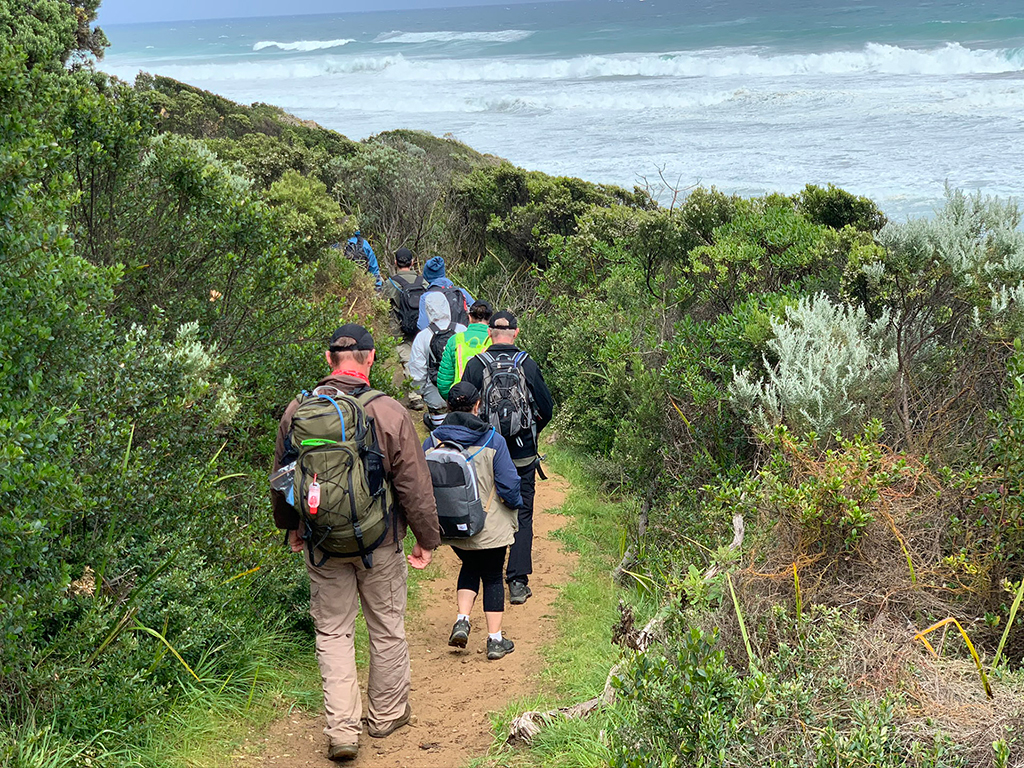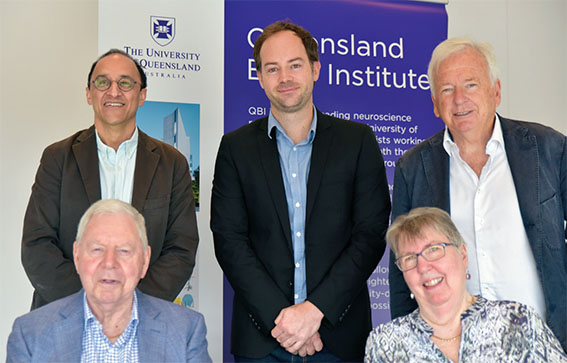The diseases we research impact people's lives
Our researchers are dedicated to improving lives through neuroscience. Thanks to the generosity of all our donors, that we can continue our legacy of ground-breaking research.
Brazil Family Foundation

Recognising stroke and motor neurone disease (MND) had only limited treatment options and no cures prompted Lyn and Bobbie Brazil to establish the Brazil Family Program for Neurology in 2017. This enabled us to recruit world-leading researchers and support four laboratories.
Dr Adam Walker’s laboratory has defined some of the early triggers of MND to enable the best targeted approaches for therapies and identified ways to prevent the abnormal accumulation or improve the removal of a protein that causes motor neurons to die.
Dr Tara Walker is examining whether the dietary supplement selenium can prevent or decrease cognitive or motor deficits following stroke.
Dr Matilde Balbi aims to understand how stimulating the cortex in different ways reduces the loss of brain cells after a stroke and whether this mitigates behavioural deficits.
Professor Gail Robinson’s stroke research aims to improve cognitive assessment tests used to evaluate stroke survivors, in the acute phase, to predict long-term outcomes and to develop more targeted, personalised therapy strategies. Professor Robinson also aims to improve our understanding of the biological basis of MND.
The Brazil Family have also donated generously to our Alzheimer’s disease research. This gift contributed to Professor Jürgen Götz and his team’s ground-breaking therapeutic ultrasound approach to target dementia. This research has identified a range of potential applications for ultrasound, including delivering drugs into the brain. The intention is to modify disease progression and ultimately cure brain diseases.
Discovery research leads to the health outcomes of the future, but it takes time and support. Researchers need preliminary data to support their applications for grants. With government grant funding becoming harder to secure , scientists with promising research potential are being lost.
Funding of researchers who narrowly miss out on government grant funding could hold the key to major breakthroughs and, with support, could continue to explore new avenues and build the data needed to be successful in subsequent grant rounds.
The Brazil Family Foundation understands the power of “near-miss” applications and are supporting our scientists with a gift which enables them to continue collecting valuable data to improve their grant success in future funding rounds.
The whole of the QBI community pays tribute to the Brazil Family Foundation whose generosity and support enables us to continue our pathway to expanding our understanding of the brain, the underlying causes of brain disease and help develop new treatments which will benefit the community at large.

Great Ocean Walk, raised over $125 000 to support
brain research.
NFIA Trekkers do the hard yards for QBI
Through the hard work of Brian Davies, a successful businessman and immediate past-president and patron of the National Fire Industry Association (NFIA), and his wife, Liz, QBI was the joint-recipient of a donation of over $250 000 in 2019.
This incredible effort was the result of the NFIA Patron’s Walk held in October, which may sound like a scenic walk in the park but Brian, Liz and seven other NFIA members spent three days enduring driving rain and winds of close to 50 knots coming straight from Antarctica.
The idea for the walk came while the couple were completing the Three Capes Walk to raise money for the Queensland Brain Institute in 2018.
On that walk, Liz suggested to Brian that as the patron of the NFIA, he could create his own walk for charity. Mr Davies believes that corporate Australia has a big responsibility to give back, which is testament to the success of the inaugural walk. The money raised was shared between the Queensland Brain Institute and the Gallipoli Medical Research Foundation (GMRF).
The NFIA walk is the first of three walks to raise money for research at QBI and GMRF, with the aim of raising $500 000 in three years. The donation from the NFIA walk will help QBI’s research into motor neurone disease, dementia, Parkinson’s disease, stroke and QBI’s Discovery Research Endowment fund, which enables fundamental research into major health issues, including depression, anxiety, PTSD and epilepsy. QBI is extremely grateful to Brian and Liz and the NFIA team for their support.
The NFIA walk is the first of three walks to raise money for research at QBI and GMRF, with the aim of raising $500 000 in three years.
The Stafford Fox Medical Research Foundation

(QBI Director) and Dr Steven Zuryn and Emeritus Professor Perry Bartlett AO (back row).
In 2019, The Stafford Fox Medical Research Foundation confirmed its continued generous support of the prestigious $2.5 million philanthropically funded international fellowship to Dr Steven Zuryn at the Queensland Brain Institute to fight stroke-induced dementia, also known as vascular dementia. The Foundation also continues to support the work of Emeritus Professor Perry Bartlett’s research into prevention of dementia in ageing by improving cognition through exercise.
The Stafford Fox Medical Research Foundation was established in 2013 following the death of Moyna Fox, and named in honour of her late husband, James Stafford Fox, a former BP Australia chief executive.
Stafford and Moyna Fox started one of Australia’s wealthiest medical research foundations after many years of careful planning, resulting in a fund worth over $100 million. It was only publicly revealed in Moyna’s will when she died in 2013, many years after her husband.
James Stafford Fox was a private person, tall, physically imposing, but without a, particularly dominant personality. He rose from a position as a junior clerk at the Port Melbourne depot of the Commonwealth Oil Refineries (COR) in 1932, to become the first Australian chief executive of BP Australia Ltd in 1971.
James Stafford Fox spent three years at the helm of BP Australia, and retired in 1974 at age 60, remaining on several boards until 1985. By 1990, he was in poor health, suffering, among other things, from dementia. He entered a nursing home and died in 1994. By that time, he had already charted the course that would lead to the establishment of the foundation. Moyna lived on for more than 18 years, knowing what would happen after her death, but never revealing it publicly. Eventually, she too succumbed to dementia and died in 2013. The couple, who were so careful with their money and who clearly had no desire for fame and prominence during their lifetime, will now forever be remembered for their generosity in setting up the Stafford Fox Medical Foundation.
The Foundation’s support of QBI is crucial in enabling Emeritus Professor Bartlett and Dr Steven Zuryn to continue their work in finding solutions for the growing challenge of dementia today. This cutting- edge research is helping put Queensland and Australia at the forefront of world medical research.
What your donations fund
Your support can help us achieve a range of achievements

World leading research

Brightest scientific minds

Solutions to global health challenges
"I think it is important for people with dementia, their families and carers, to know that they are not forgotten, and that there’s a lot of work going on behind the scenes at QBI to try to unravel the tangled web that is dementia."
– Robyn Hilton (established the Peter Hilton Senior Research Fellowship in Ageing Dementia)
Hear from one of our supporters
Jeff Maclean, Chair of QBI Advisory Board
Got a story you would like to share?
Are you a donor or supporter of QBI and would like to share your story? We would love to hear from you!
Research in action
Anggono: Synaptic Neurobiology
Group Leader
Associate Professor Victor Anggono
ARC Future Fellow - Group LeaderQueensland Brain InstituteResearcher profile is public:1Supervisor:Researcher biography:Victor Anggono received his PhD in 2007 from the University of Sydney and undertook his postdoctoral training at the Johns Hopkins University in Baltimore, USA. In 2012, Dr Anggono returned to Australia as an NHMRC CJ Martin Research Fellow and joined the Queensland Brain Institute at the University of Queensland, where he is currently a Senior Research Fellow and Group Leader at the Clem Jones Centre for Ageing Dementia Research. His research aims to understand the molecular mechanisms of synaptic vesicle and glutamate receptor trafficking in neurons, processes that are essential for synaptic transmission, plasticity, learning and memory, and how their dysregulations impact on the pathophysiology of neurodegenerative diseases and neuropsychiatric disorders. Dr Anggono has published in journals such as Nature Neuroscience, Neuron, The Proceedings of the National Academy of Sciences USA, Journal of Neuroscience and Cell Reports, and has attracted more than 1500 citations. For his works, Dr Anggono was awarded the Boomerang Award (Australian Society for Biochemistry and Molecular Biology, 2011), the Young Scientist Award (Federation of Asian and Oceanian Biochemists and Molecular Biologists, 2015), the Science to Art Award (NHMRC, 2015) and more recently the Young Investigator Award (Asian-Pacific Society for Neurochemistry, 2016).
Body: Associate Professor Victor Anggono: Synaptic neurobiology
Associate Professor Victor Anggono: Synaptic neurobiologyOur research combines biochemical, molecular and cellular biology in both cell culture (primary neurons and cell lines) and mouse models. We utilise gene editing technology, cutting-edge microscopy, proteomics, next-generation sequencing and behavioural analyses in our study. We are particularly interested in understanding the complex neuronal signalling cascades through protein-protein interactions and post-translational modifications of key synaptic molecules.
Team Leader - RNA epitranscriptomics team
Dr Jocelyn Widagdo
Research FellowClem Jones Centre for Ageing Dementia ResearchResearcher profile is public:1Supervisor:Researcher biography:Jocelyn Widagdo received her PhD in 2011 from the University of New South Wales. After a short period of postdoctoral training at the Johns Hopkins University in Baltimore, USA, Dr Widagdo returned to Australia in 2012 and joined the Queensland Brain Institute, the University of Queensland, where she is currently a Research Fellow at the Clem Jones Centre for Ageing Dementia Research. Her research aims to understand how the process of synaptic plasticity, learning and memory are underpinned by dynamic regulation of DNA, RNA and proteins, and consequently, how they contribute towards the pathophysiology of neurodegenerative diseases and neuropsychiatric disorders. Her works were published in journals such as The Proceedings of the National Academy of Sciences USA, Journal of Neuroscience and Cell Reports, and has attracted more than 1500 citations. Dr Widagdo was awarded a Discovery Early Career Researcher Fellowship (2017-2020) and a Discovery Project grant from the Australian Research Council (2023-2025).
Research Members
Dr Anson Tan
Postdoctoral Research FellowQueensland Brain InstituteResearcher profile is public:1Supervisor:Researcher biography:Anson received his PhD in 2018 from the University of Melbourne and continued his study on the molecular basis of membrane trafficking and protein sorting in the Golgi with Professor Paul Gleeson. In 2020, Dr Tan joined the Queensland Brain Institute at the University of Queensland, where he is currently a Postdoctoral Research Fellow at the Clem Jones Centre for Ageing Dementia Research. His research at the Anggono laboratory aims to understand the molecular mechanisms of membrane trafficking in neurons, processes that are essential for synaptic transmission, plasticity, learning and memory, and how their dysregulation led to neurodegenerative diseases and neuropsychiatric disorders. Dr Tan was recently awarded the UQ Postdoctoral Researcher Retention Fellowship (University of Queensland, 2022).
Dr Nishita Bhembre
PhD student & Postdoctoral Research FellowQueensland Brain InstituteResearcher profile is public:1Supervisor:Students
Mr Tianyi Zhu
PhD Student & Casual Research Assistant & Postdoctoral Research Fellow/Research OfficerQueensland Brain InstituteResearcher profile is public:0Supervisor:Dr Hilary Yong
PhD Student & Postdoctoral Research FellowQueensland Brain InstituteResearcher profile is public:0Supervisor:Miss Ana Batallas Borja
PhD StudentQueensland Brain InstituteResearcher profile is public:0Supervisor:Mr Sooraj Siva Das
PhD Student & Casual Research AssistantQueensland Brain InstituteResearcher profile is public:0Supervisor:Mr Lingrui Zhang
PhD student & Casual Scientific Services OfficerQueensland Brain InstituteResearcher profile is public:0Supervisor:Mr Rezanur Rahman
PhD Student & Scientific AssistantQueensland Brain InstituteResearcher profile is public:0Supervisor:Miss Amira Mohany
PhD StudentQueensland Brain InstituteResearcher profile is public:0Supervisor:Miss Madeline Eve
PhD StudentQueensland Brain InstituteResearcher profile is public:1Supervisor:- She is one of Australia’s most prolific and highly awarded children’s authors and yet Jackie French suffers from a learning disorder that made reading and writing an ordeal for her when she was growing up.

